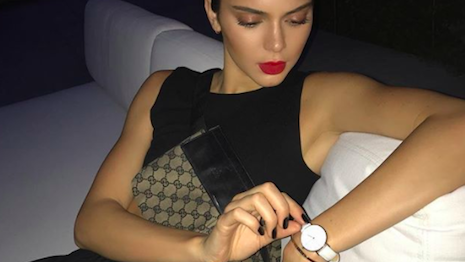- About
- Subscribe Now
- New York,
December 6, 2017

 Daniel Wellington sponsored post from Kendall Jenner, one of the most sought after celebrity influencers. Image credit: Kendall Jenner
Daniel Wellington sponsored post from Kendall Jenner, one of the most sought after celebrity influencers. Image credit: Kendall Jenner
Celebrity endorsements have been a longtime strategy for luxury marketers, but today’s increasingly interactive climate has shifted the manner in which these campaigns are created.
Social media has become a vital component of brand endorsements, with pressure put on celebrities to be more engaging. According to the “Age of Social Influence” report from Celebrity Intelligence and Fashion & Beauty Monitor, only 8 percent of brand survey takers claim to work with celebrity influencers who do not have a social media presence.
“The findings from this report reveal a new approach to celebrity marketing where a planned layered approach gets businesses both, brand awareness and audience engagement,” Priyanka Dayal, content marketing manager at Fashion & Beauty Monitor, London. “As Body Shop states within the report, brands are no longer looking for just a ‘pretty face’ to lead their campaigns, they’re looking for niche, targeted, authentic conversations that will engage and stimulate their audiences.
“This explains why brands have begun to take a more data-driven approach to their celebrity and influencer engagement, relying less on who’s trending, and instead making a more informed decision about who resonates best with their audience at 85 percent,” she said.
Digital over traditional
Digital influencers have been the largest group of endorsements that brands have worked with this past year.
In the survey, 61 percent of brands claimed they have worked with digital influencers in the past year.
Data is becoming most influential regarding insight in an influencer campaign, with 59 percent saying it is the most important tool in finding the best influencer. However, 75 percent of brands are still using manual research to discover new influencers to work with across social media and digital platforms.
Brands believe that discovering the best celebrity or influencer is a difficult task with 84 percent agreeing so.
Relevance and a niche audience are the most impactful aspects of a digital influencer campaign. For instance, 85 percent of marketers say that a relevant audience is critical.
Niche influencers who are women are likely to rise in popularity over the next year, according to 75 percent of marketers. The less the influencer has been tapped for commercial use, the more impactful and meaningful the relationship can be.
Additional insight
Micro-influencers on social media have a greater impact than celebrities when it comes to branded posts due to their niche audiences, according to L2.
Celebrities and mega-influencers see modestly elevated engagement rates, but micro-influencers have much greater engagement rates. However, micro-influencers post eight times more sponsored posts and brand partners than celebrities, which can over time annoy followers (see more).
Luxury is far and away the most-prolific collaborator with influencers on Instagram, but brands need to be aware of how to pick the best tastemaker with the right scale and focus for the campaign.
L2 released another report delving into the data of influencers to help brands understand how follower count, authenticity and other factors play into an influencer’s effectiveness. The key point is that not all influencers are created equal and brands need to pick the right influencer that works for them (see more).
“The report found that for every £1 ($1.34) spent on talent-led campaigns in 2017, brands say they are getting an average of £17.21 ($23.08) back," Fashion & Beauty Monitor's Ms. Dayal said.
"While the return is undoubtedly very optimistic, it’s hardly surprising given the rates, that sometimes go into hundreds of thousands, we’re seeing celebrities and influencers command for a single social media post these days,” she said.
Share your thoughts. Click here